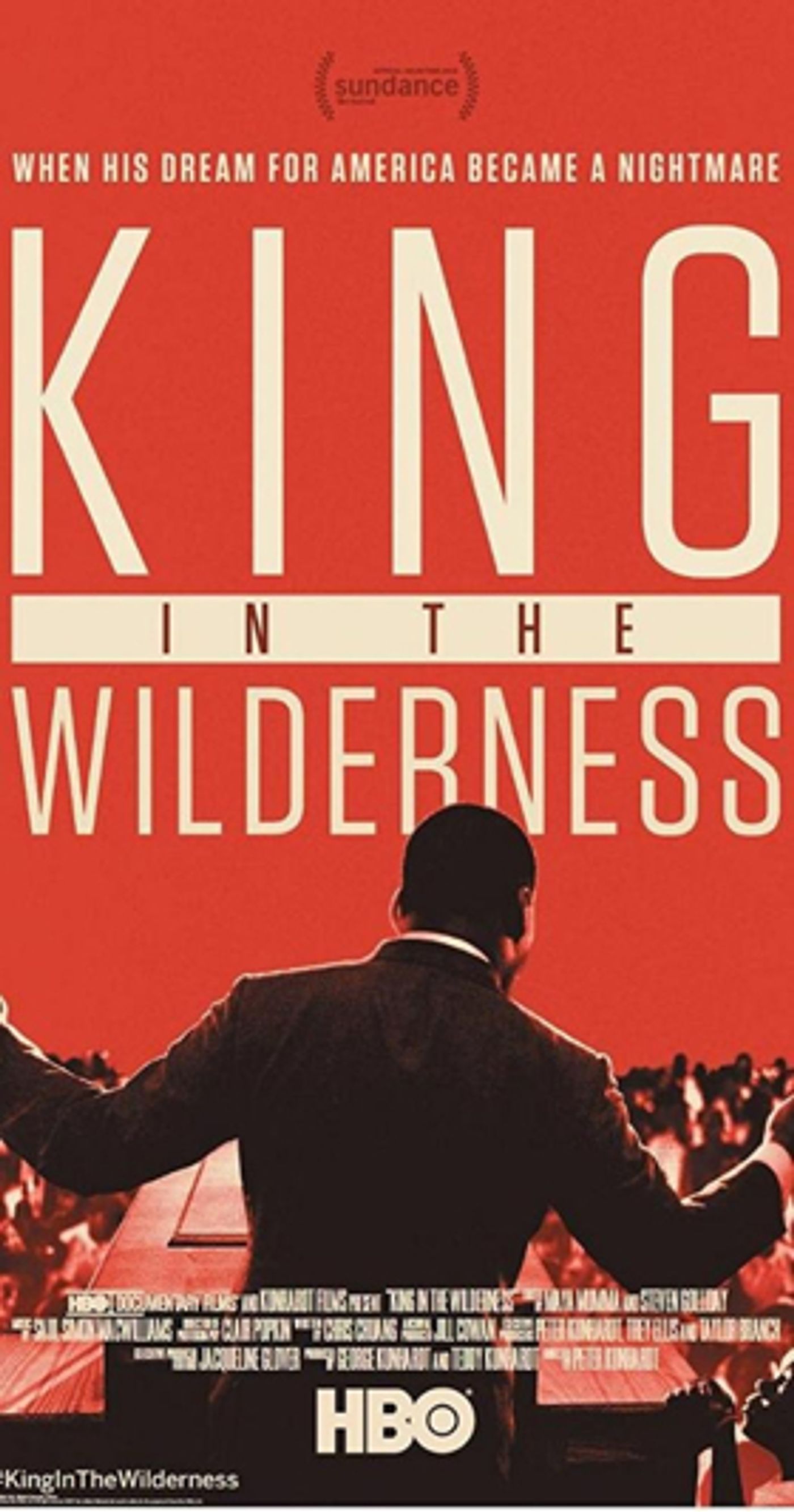HBO To Debut Martin Luther King Jr. Documentary KING IN THE WILDERNESS 4/2

Dr. Martin LUTHER King, Jr.'s leadership during the bus boycotts, the sit-ins and the historic Selma-to-Montgomery marches is now legendary. Much of what happened afterward, during the last three years of his life, is rarely discussed, but it was a time when Dr. King said his dream "turned into a nightmare." From the passage of the Voting Rights Act in 1965 to his assassination in 1968, King remained unshakably committed to nonviolence in the face of an increasingly unstable country.
Directed by Peter Kunhardt (HBO's Emmy®-winning "Jim: The James Foley Story") KING IN THE WILDERNESS chronicles the final chapters of Dr. King's life, revealing a conflicted leader who faced an onslaught of criticism from both sides of the political spectrum. While the Black Power movement saw his nonviolence as weakness, and President Lyndon B. Johnson saw his anti-Vietnam War speeches as irresponsible, Dr. King's unyielding belief in peaceful protest became a testing point for a nation on the brink of chaos. The compelling documentary debuts MONDAY, APRIL 2 (8:00-10:00 p.m. ET/PT), two days before the 50th anniversary of his death, exclusively on HBO.
The film will also be available on HBO On Demand, HBO NOW, HBO GO and partners' streaming platforms.
Drawing on conversations with those who knew him well, including many fellow members of the Southern Christian Leadership Conference (SCLC), KING IN THE WILDERNESS reveals stirring new perspectives on Dr. King's character, his radical doctrine of nonviolence and his internal philosophical struggles prior to his assassination in 1968. The documentary also features archival footage of King's most rousing speeches, behind-the-scenes video of his private moments, intimate archival photographs and phone conversations recorded by President Johnson, who was both ally and adversary in King's fight for civil rights.
By 1966, following a series of civil rights successes, Dr. Martin LUTHER King, Jr. felt that the movement had moved towards a more difficult struggle for legal equality. In response to riots in Northern cities, he decided to expand north to Chicago, moving into a bare-bones walkup and launching The Movement to End Slums, which faced resistance from THE MAYOR and black pastors in the community. King also had to contend with Student Nonviolent Coordinating Committee (SNCC) leader Stokely Carmichael, who preached black power and the abandonment of white allies. King tried to be supportive without endorsing the message, but struggled with this first real philosophical challenge.
Pressured by Carmichael to take a strong anti-war stance, King was hesitant to criticize the president. Instead, he continued his open-housing crusade, which was met by one of the most violent, hate-filled responses he ever encountered. "Chicago was a huge awakening for him," says HARRY Belafonte, who often hosted King in New York and noticed how physically and emotionally exhausted he was after facing a new kind of white aggression in the North.
Coretta King was openly anti-war before her husband, but King eventually made his long awaited speech condemning the war on April 4, 1967. The next morning, he was stunned by criticism from the media and friends in what Belafonte calls his "single most challenging moment."
With riots continuing around the country in 1967, King grew increasingly dejected, until organizer Marian Wright Edelman brought him the idea of the Poor People's Campaign. Revitalized, he began to plan a second march on Washington to shift attention from Vietnam to poverty. When Memphis sanitation workers went on strike to protest low wages and safety issues, King seized the opportunity to travel to the city and support their cause, despite concerns for his safety.
Friends recall that he often joked about death in later years. "He was prepared to die," says Andrew Young, "but he was also determined that his death and his life would have meaning," After a first visit to Memphis, King proposed a return trip with his executive staff.
On the morning of King's assassination, Young remembers him as "the happiest I had seen him in a long time," following a rousing speech the night before. That evening, King was shot and killed on his hotel balcony. The nation mourned a tremendous loss, and would never be the same, but King's legacy lives on. Noting that King's message is as relevant today as it was in 1968, Edelman hopes America will "keep moving forward" and one day realize King's dream.
Interviewees in KING IN THE WILDERNESS include: Clifford Alexander, chairman, U.S. Equal Employment Opportunity Commission; musician and activist Joan Baez; musician and activist HARRY Belafonte; Joseph Califano, special assistant to Pres. Johnson; Xernona Clayton, SCLC organizer; Dorothy Cotton, education director, SCLC; Marian Wright Edelman, Mississippi director, SCLC; Richard Fernandez, church activist; Mary Lou Finley, staff member, SCLC; Jesse Jackson, director, SCLC Operation Breadbasket; Clarence Jones, advisor and personal lawyer; Bernard Lafayette, staff leader, SCLC; John Lewis, board member, SCLC; Diane Nash, field organizer, SCLC and SNCC; Cleveland Sellers, program director, SNCC; CT Vivian, director of affiliates, SCLC; and Andrew Young, executive director, SCLC.
KING IN THE WILDERNESS debuted at the 2018 Sundance Film Festival.
Kunhardt Films' previous HBO credits include "The Newspaperman: The Life and Times of Ben Bradlee," the Emmy®-nominated "Nixon by Nixon: In His Own Words," the Emmy®-nominated "Gloria: In Her Own Words," the Emmy®-winning "Teddy: In His Own Words" and the Emmy®-winning "Jim: The James Foley Story."
KING IN THE WILDERNESS is a co-production of HBO and Kunhardt Films; directed by Peter Kunhardt; produced by George Kunhardt and Teddy Kunhardt; executive produced by Peter Kunhardt, Taylor Branch and Trey Ellis; edited by Maya Mumma, A.C.E. and Steven J. Golliday; written by Chris Chuang; director of photography, Clair Popkin; music by Saul Simon MacWilliams; interviews by Taylor Branch and Trey Ellis. For HBO: executive producer, Jacqueline Glover.
Videos

